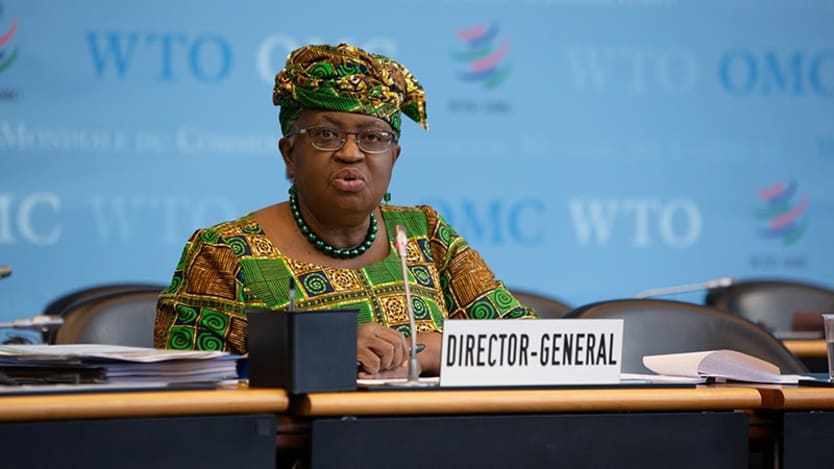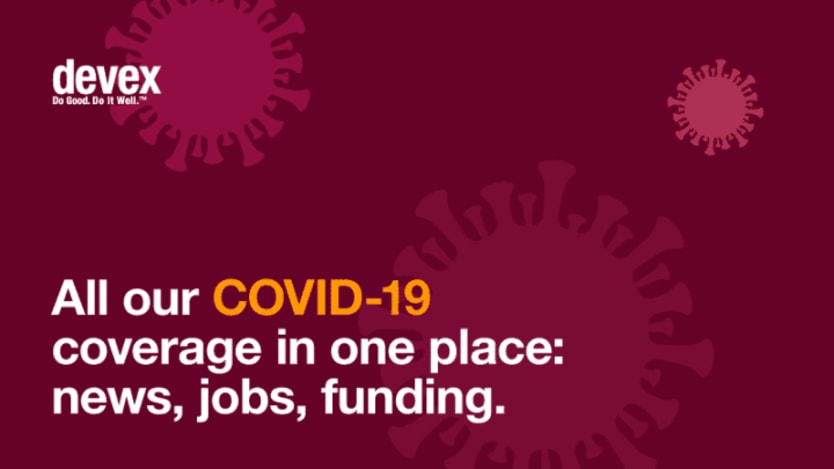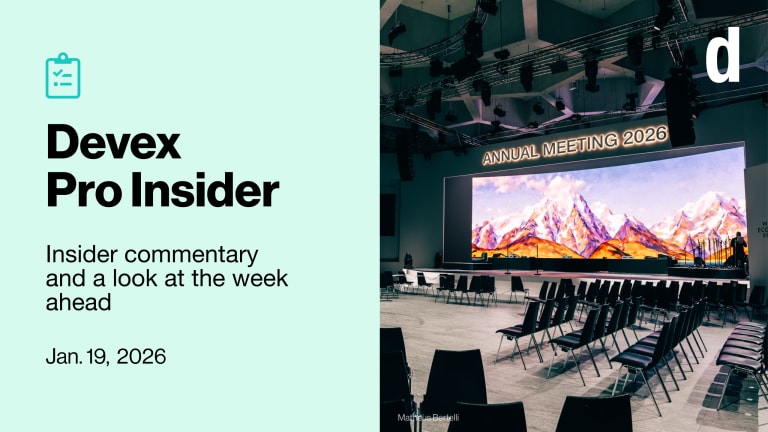
Despite a push from activists, high-income country support did not materialize for South Africa and India’s proposal to waive intellectual property protections on COVID-19 vaccines and treatments at this week’s World Trade Organization General Council meeting.
At the same time, the waiver’s proponents were worried that newly installed WTO Director-General Ngozi Okonjo-Iweala’s push to steer a “third way” of addressing vaccine shortages between vaccine nationalism and temporarily overriding international trade regulations, would distract from their push for the waiver.
The proposal would suspend global intellectual property protections around products that protect, contain, and treat COVID-19 until the pandemic is under control. The suspension would apply to patents, copyrights, industrial designs, and undisclosed information.
Tabled in October at WTO’s Council for Trade-Related Aspects of Intellectual Property, or TRIPS, the waiver proposal has remained there, despite a 90-day limit, after which the council is supposed to submit a report to the Ministerial Conference.
In the past, at WTO, where decisions are historically made by reaching consensus, the opposition of the United States, the European Union, and other high-income countries has been enough to block the waiver’s progress even to the stage of text-based negotiations.
The delay has been created, in part, by requests from countries such as Canada, Australia, and Chile for evidence that the waiver would actually accomplish the goal of facilitating additional vaccine manufacturing and help resolve the current shortages.
“What they are hoping is they can discuss and drag this issue out and that things will be OK by the summer,” said Burcu Kilic, the research director for access to medicines at Public Citizen. “COVID-19 is not going anywhere. Maybe it’s going somewhere [in the United States], but not in other countries.”
Even as it has languished in the TRIPS Council, the waiver has steadily gained support from countries across the global south. It is now co-sponsored by 57 countries, as well as the entire Africa Group and Least-Developed Country Group at WTO.
“There may be a way to get what each side wants.”
— Gary Winslett, intellectual property expert, Middlebury CollegeThe waiver’s supporters were tentatively hoping to add a crucial country’s support at this week’s General Council. In the run up to the virtual meeting, activists had been pressuring U.S. President Joe Biden’s administration to break with its predecessor and come out in favor of the waiver.
Calling the current disparity in access a “vaccine apartheid” during a press conference last week, U.S. Representative Jan Schakowsky said more than 30 members of Congress had signed on to a letter calling on the Biden administration to support the waiver.
European leaders are facing similar pressure. At least 115 of the more than 700 members of the European Parliament called on European Commission leaders to drop their objections to the proposal.
That support didn’t materialize at the General Council, though according to reports, neither U.S. nor EU officials spoke about the TRIPS waiver at all during the meeting. Thiru Balasubramaniam, the Geneva representative for Knowledge Ecology International, said it was “interesting” that neither commented, but that it was difficult to draw any conclusions about what that might mean, particularly with the United States in the middle of a government transition. As for Europe, “it could just be that they thought they had already said what needed to be said.”
A third way
While activists were trying to keep up the political pressure, Okonjo-Iweala’s “third way” dominated much of the conversation in the run up to the General Council.
At WTO, a battle for access to COVID-19 vaccines
A proposal introduced by South Africa and India seeks to waive intellectual property protections for COVID-19 vaccines and other technologies. Andrew Green looks at why some high-income countries are trying to stop it from being passed.
Okonjo-Iweala floated the idea in a speech ahead of officially taking office Monday, arguing that there was a path to increasing access “through facilitating technology transfer within the framework of multilateral rules” and by pharmaceutical companies striking licensing deals to allow other manufacturers to produce vaccines and other products.
Kilic called Okonjo-Iweala’s proposal “disappointing,” particularly because there is nothing to stop companies from initiating technology transfers or voluntary licenses already.
“But the pharma industry has really picked up on this ‘third way,’” she said. “And it’s really allowed them to shift the focus.”
Still, some observers said Okonjo-Iweala’s call for another way forward has opened up the space for thinking about other compromises that might ultimately help improve access.
“There may be a way to get what each side wants,” said Gary Winslett, an expert on intellectual property based at Middlebury College in Vermont. “What the global north would like to do is uphold the intellectual property system. At the same time, developing countries want a commitment that the richer countries are not going to get in their way as they try to respond to COVID.”
He offered a modified proposal that would impose a two-year moratorium on enforcing patents, but remove the demands to waive intellectual property protections on copyrights, industrial designs, and undisclosed information. Winslett said that could signal to facilities with the capacity to manufacture vaccines and other products at scale that are not already doing so that they could begin without fear of reprisal.
A proposal from the so-called Ottawa Group at WTO is also gaining traction. It calls for easing any export restrictions and tariffs that might be restricting the flow of COVID-19 vaccines and treatments.
Kilic said the move to identify alternatives to the waiver disregards the ability of the countries facing the vaccine shortages to identify the best solution to their situation.
“You have 57 developing countries saying they need this waiver to help themselves,” she said. “There are many solutions, but this is what the countries are asking for. These countries want to help themselves, help their people.”
For supporters of the waiver, the next opportunity for a breakthrough will come at the TRIPS Council meeting scheduled to begin next week. But the meeting has a crowded agenda and Balasubramaniam said if any progress comes, he expects it will be in informal or bilateral meetings on the sidelines.

Search for articles
Most Read
- 1
- 2
- 3
- 4
- 5








